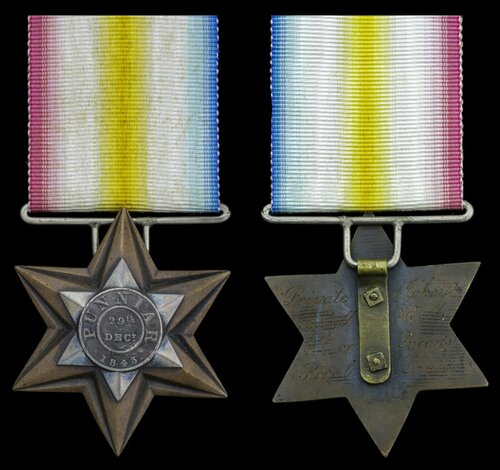
Auction: 20003 - Orders, Decorations and Medals
Lot: 730
The important Punniar Star awarded to Private John Purcell, V.C., 9th (Queen's Royal) Lancers, who was awarded the Victoria Cross for his part in saving the life of Brigadier Sir James Hope Grant during a desperate hand-to-hand combat outside Delhi
Grant related the particulars of Purcell's valour in an effusive letter, and stood by his bedside as he lay dying from wounds received in the final assault on Delhi; the posthumous Victoria Cross was presented to his brother James
Punniar Star 1843 (Private John Purcell H.M. 9th or Queen's Royal Lancers), replacement silver bar suspension, good very fine
[V.C.] London Gazette 15 January 1858.
John Purcell was born at Macroom, County Cork in 1821. After civilian employment as a labourer, he enlisted into the 4th (Royal Irish) Dragoon Guards at Cork on 27 May 1839, and joined the Regiment at Birmingham on 13 June that year. The Muster Roll of the 9th Lancers (WO12/889) shows that he transferred to that Regiment on 1 April 1842 (No. 1055). The 9th Lancers sailed for India shortly afterwards, playing a prominent role at the Battle of Punniar on 29 December 1843 (Star). In this action a force of 12,000 Mahrattas was driven from an entrenched position on high ground. Purcell went on to serve during the Sutlej Campaign of 1845-46, and the Punjab Campaign of 1848-49, including the final charge at Goojerat on 21 February 1849. His medallic entitlement is confirmed on the Medal Rolls for both campaigns. In 1853 he married Maria Louisa Purcell in Bengal.
Purcell gave noble service during the Indian Mutiny. Following the Battle of Bundlekeserai on 8 June, the British force besieging Delhi remained highly vulnerable to rebel counter-attacks. At dusk on 19 June, a large body of mutineers sallied forth from the city walls and reached the British siege guns, which they tried to spike or capture. Brigadier Sir Hope Grant, the beau idéal of British forces during the Mutiny, saw this development and charged into the mass of rebels. A rebel marksman put a ball through the neck of Grant's charger at point-blank range; the horse struggled on for fifty yards before collapsing. Surrounded by the enemy, Grant's chances looked slim, until salvation came. On 22 June, Grant wrote the following letter to the Deputy Assistant Adjutant General (WO32/7309):
'The guns, I am happy to say, were saved, but a waggon of Major Scott's battery was blown up. I must not fail to mention the excellent conduct of a Sowar of the 4th Irregular Cavalry, and two men of the 9th Lancers, Privates Thomas Hancock and John Purcell, who, when my horse was shot down, remained by me throughout. One of these men and the Sowar offered me their horses, and I was dragged out by the Sowar's horse. Private Handcock was severely wounded, and Private Purcell's horse was killed under him. The Sowar's name is Roopur Khan.'
Purcell and Handcock were awarded the Victoria Cross while Roopur Khan received the Order of Merit (2nd Class), the equivalent for native troops at that time. It would be months before the decorations crossed the oceans from England. Purcell continued to serve in the besieging army, and was present during the final assault on Delhi on 14 September, when he received his mortal wound. The bravery shown by the 9th Lancers became the stuff of legend: they rode in front of the walls to draw enemy fire while the infantry assaulted the breaches, and lost some 40 casualties in this way. Purcell was among them. In his memoirs, Sir Hope Grant lamented:
'I took the cavalry back to camp and then visited all the wounded men in hospital. Among them was poor Purcell, who as my orderly had behaved so gallantly on the 19 June when in the darkness of the night I was almost alone and riderless in the midst of the rebels. He had been shot through the chest and could scarcely speak, but was full of hope. He died a few days later.'
The gallant Purcell succumbed to his wounds on 19 September 1857, aged 36, and was buried outside camp the following day by Father Bertrand, a Franciscan Chaplain. On 1 February 1858, the War Office confirmed Purcell's posthumous award of the Victoria Cross and sent the award to Lord Clyde in India, instructing him to bestow it in lieu of the Queen (WO32/7309). Purcell's brother was presented with the Decoration in a suitably impressive ceremony. This brother could possibly be the James Purcell, also of the 9th Lancers, who appears on the Mutiny Roll with clasps for Delhi, Relief of Lucknow and Lucknow; sold with a file of copied research.
Recommended reading:
Doherty, R. and Truesdale, D., Irish Winners of the Victoria Cross (Dublin, 2000).
The location of his Victoria Cross and Campaign Medal remain unknown - this Punniar Star residing in the present collection for over 40 years.
Subject to 20% VAT on Buyer’s Premium. For more information please view Terms and Conditions for Buyers.
Sold for
£2,900
Starting price
£2800




